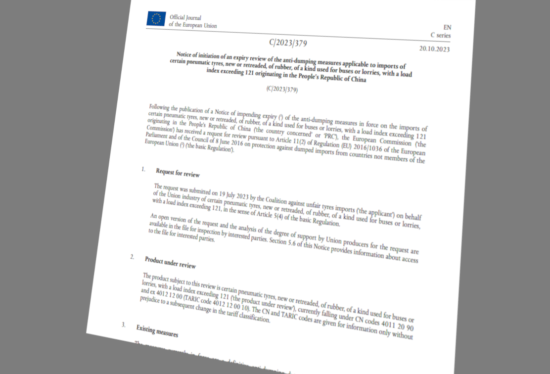Coalition against unfair tyre imports requests tariff review
 The investigation will be concluded “within 12 months and in any event no later than 15 months from the date of…publication” (20 October 2023), according to the Commission
The investigation will be concluded “within 12 months and in any event no later than 15 months from the date of…publication” (20 October 2023), according to the Commission
Ahead of the expiry of anti-dumping tariffs on China-produced truck tyres imported into the European Union, on 20 October the European Commission reported receiving a request to review these. The European industry observers our sister title Neue Refeinzeitung (NRZ) spoke to expect a preliminary decision at the beginning of the review. Meanwhile, Chinese market sources told Tyrepress China that the tyre makers at the centre of the case have generally responded “calmly”, having become accustomed to “trade barriers” from Europe. Whatever the current market reaction is, the investigation will be concluded “within 12 months and in any event no later than 15 months from the date of…publication” (20 October 2023), according to the Commission.
The request is based on the grounds that “the expiry of the measures would be likely to result in continuation or recurrence of dumping and continuation or recurrence of injury to the Union industry.” The allegations themselves centre on suggestions that the Chinese state is artificially supporting the production of excessively low-priced tyres. That specifically means “distortions and state presence” in relation to preferential “bankruptcy and property laws” and “distortions with regard to land, energy, capital, raw materials and labour” across Chinese business in general as well as the Chinese tyre industry specifically. In addition, similar practices are said to take place in the upstream businesses that supply Chinese tyre makers such as “petrochemicals, natural rubber, steel and textile” suppliers.
In making its decision, the Commission will use data relating to third country markets in order to determine what pricing levels in a comparably developed market ought to look like. Brazil is currently topping the list of options as the only country suggested by the Commission at this point. The basis for the eventual choice will be: “a similar level of economic development as the PRC, in which there is production and sales of the product under review and in which relevant data are readily available.” If there is more than one such country, preference will be given to countries with “an adequate level of social and environmental protection”. In other words, the Commission is not just comparing alleged disruptive state support of Chinese tyre makers as well as low input and manufacturing costs but also the relatively high ESG standards of European tyre makers.
The allegations themselves centre on suggestions that the Chinese state is artificially supporting the production of excessively low-priced tyres. That specifically means “distortions and state presence” in relation to preferential “bankruptcy and property laws”
The complaint was made by the “Coalition against unfair tyres imports [sic]” on 19 July 2023. The same coalition initiated the original investigation that resulted in the last round of anti-Chinese-made truck tyre tariffs. At that time, the European retreading association BIPAVER formed the alliance together with two new tyre manufacturers. Then as now, the two companies said to be the driving forces behind the entire process are Michelin and Continental.
When NRZ questioned Continental about the matter, the German manufacturer declined to comment. However, a spokesperson at Michelin’s Clermont-Ferrand headquarters said: “Michelin takes note of the publication of the European Union to investigate imports of tyres for buses and trucks originating in the People’s Republic of China,” adding that Michelin has noted in recent years that the European retreading business model is being undermined by the impact of very low-price imports and is still under serious threat, despite the existing anti-dumping measures. Such “disposable products” have had “a negative impact on the retreading business model, in which used tyre casings are upgraded to give them a second and third life and to promote a sustainable economic and ecological approach”.
Continuing, the French tyre maker adding that “Michelin, with its global industrial presence and activities, sees all trade barriers as a missed opportunity for economic development. For this reason, Michelin has always campaigned against trade barriers and for free trade, provided that it is a fair trade that is free of anti-competitive elements.”
While it is too early for an official verdict, some market sources expect that something similar to the last round of import tariffs will be implemented for another five years. As we saw at the start, Chinese industry sources suggest Chinese tyre makers have reacted to news of the investigation “calmly”, having become accustomed to “trade barriers” from Europe. In any case, all the leading Chinese tyre makers have continued making money in Europe by producing tyres in non-Chinese low-cost Asian markets such as Thailand, Vietnam and Cambodia. Indeed, that’s why there is the opinion that any future measures should be extended to the countries Chinese manufacturers have used since 2018 to sidestep EU tariffs.



Comments